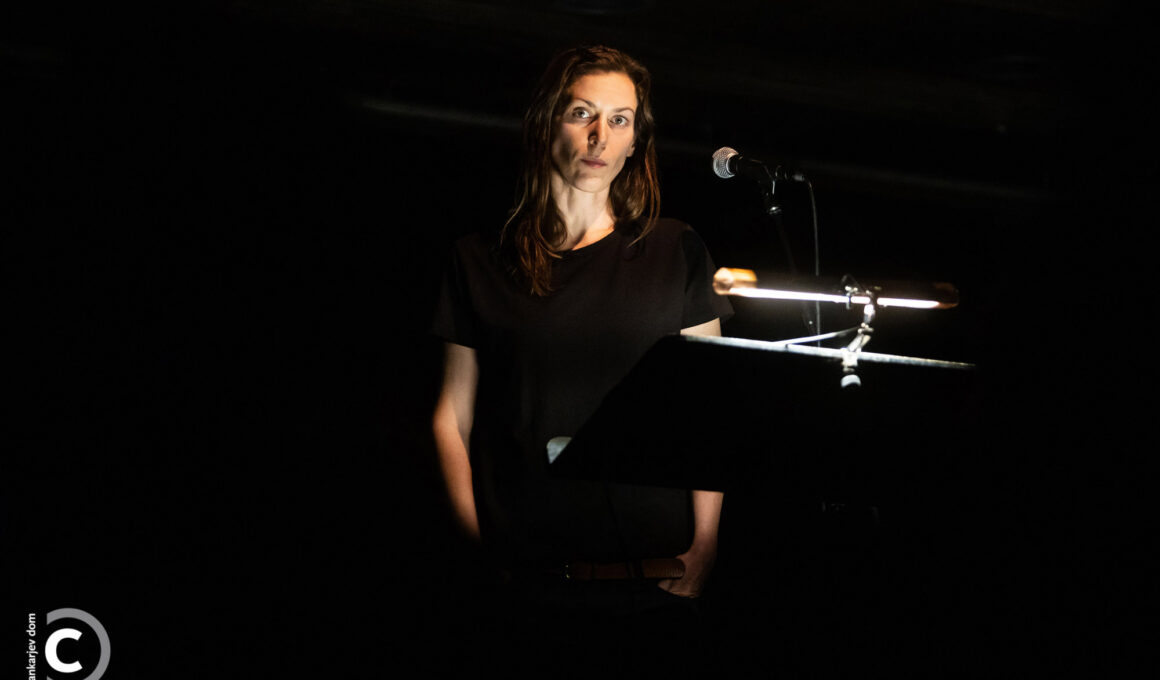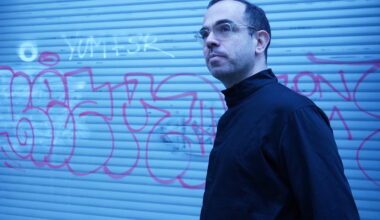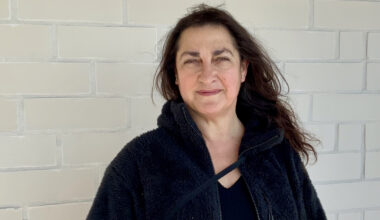Nina Dragičević is a composer, poet, essayist, and a Doctor of Sociology. She is the author of the books Kako zveni oblast?, To telo, pokončno, Ljubav reče greva, Med njima je glasba, Slavne neznane, and Kdo ima druge skrbi, as well as numerous sound compositions and the albums Parallellax and Ma’am there is no such thing in reality. Her work is centered primarily on the intersections of critical theory of sound, feminism, and LGBT+ theories. She is the recipient of the Jenko Award 2021, Župančič Award 2020, and was the finalist for the Palma Ars Acustica award 2018. Dragičević is the 2023 Werner Düttmann Fellow (Akademie der Künste Berlin).
FACTS
1. “Men picture a man 80% of the time they think of a person,” (Caroline Criado Perez, Invisible Women, 2019) and “Ne jebu te pederi nego kapitalizam” (a banner sometimes seen on Pride Parades in the ex-Yugoslav countries; loosely translates into “You are not being fucked by faggots but by capitalism”)
2. See No. 1
3. See No. 2
QUESTIONS
1. What is the biggest inspiration for your music?
People.
2. How and when did you get into making music?
As a kid and later as a teenager, I played the violin and was quite convinced that this was something that would turn into a life-long career. Later I realized I much preferred composing to performing. And so here we are now.
3. What are 5 of your favourite albums of all time?
- Kenneth Patchen Reads His Poetry with the Chamber Jazz Sextet
- Ludmila Frajt’s Nokturno
- Johanna Beyer’s Music of The Spheres
- that time in 1991 when Larry Kramer of ACT UP, after patiently listening, screamed: “Plague! We are in the middle of a fucking plague! And you behave like this! Plague! Fourty million infected people is a fucking plague! And nobody acts as if it is!”
- Morton Feldman’s Neither
- imagining being there when, as Langston Hughes wrote, “For two or three amazing years, Miss [Gladys] Bentley sat, and played the piano all night long, literally all night, without stopping—singing songs like ‘The St. James Infirmary,’ from ten in the evening until dawn, with scarcely a break between the notes, sliding from one song to another, with a powerful and continuous underbeat of jungle rhythm.”
4. What do you associate with Berlin?
The joy of the first S-Bahn train arriving at the station early in the winter morning, the beautiful constant chaos around Alexanderplatz, and best of all, the old-school bars where smoking has successfully avoided biopolitical hygienization.
5. What’s your favourite place in your town?
I do most of my writing outside my home. In a kind of Debord’s dérive, I walk around, here and there, stop in a cafe, all this to enjoy the beautiful cacophony of urban surroundings. In other words, my favourite thing about the town in which I’m based is the very fact that it’s a town.
6. If there was no music in the world, what would you do instead?
I suppose Cage gave all possible answers to this question with his piece 4’33” by making the question impossible. And since many people, among them artists, are facing extreme financial and social precariousness, I find the contemplation about a world without such social and economic, intersectional constraints to be one of the most exciting endeavours when considering the world without ‘something’.
7. What was the last record/music you bought?
Daniela Casa’s Arte Moderna
8. Who would you most like to collaborate with?
I’d love to collaborate with someone who has a distinctly raspy voice.
9. What was your best gig (as performer or spectator)?
As a composer, one of my favourite gigs was the opening night of my poem/sound installation Extensions of Pleasure which is made entirely of clips of a lesbian sex act. The atmosphere that the sounds produced was a kind of blend of pleasure and uneasiness, with some people listening attentively, some falling asleep, some sort of stiff, and some making out. I enjoyed immensely this complexity and its own simplicity.
As a spectator, I can hardly choose just one performance, there is Emmanuel Holterbach’s performance of Eliane Radigue’s Transamorem Transmortem, Hilary Hahn playing Bach’s Chaconne, Irena Tomažin performing concrete poetry of the 1970s, etc., but there is a concert that really stayed with me. It was some years ago in Ljubljana, I was quite exhausted from working all day so I thought that what I needed was some rest and quiet. Instead, my partner, Nataša, took me to Gala Hala to see and hear Lydia Lunch and her band. The unrelenting force of the sonority they built there, albeit seemingly the opposite of what I needed, proved to be precisely what I needed. I remember people dancing and jumping, myself hardly moving, Nataša looking at me, smiling, and Lydia’s nonchalant facial expression when she sings “it’s not my fucking war, it’s not my war,” and tells Weasel Walter to give her “something ugly,” but he really gives her something that sounds rather beautiful.
10. How important is technology to your creative process?
It’s as important to me as anything else in terms of a field of possibility. It could be said that my artistic work is conceptual – it is the idea, the concept, that drives the entire process – but in terms of method and form it is transdisciplinary, and there the technology is not an object but an exciting exploration of how to realize the idea.
11. Do you have siblings and how do they feel about your career/art?
I have a brother, Oliver, who is eight years older than me. Some of my earliest memories are listening to him play the accordion, and in the later years, jamming together with him in our room and listening to Shostakovich’s 7th. Today, he is still one of my most avid supporters.


